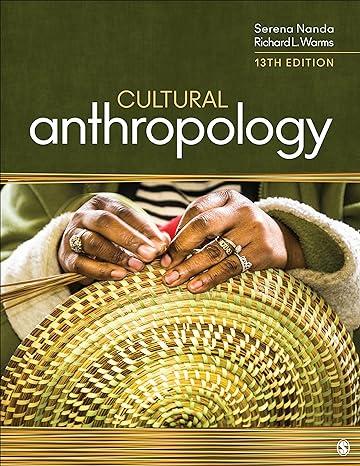In the future, will Americans be increasingly united by their culture or increasingly divided by it? Throughout
Question:
In the future, will Americans be increasingly united by their culture or increasingly divided by it?
Throughout this chapter, we have identified culture as something shared by a group of people. This is a necessary aspect of culture. However, it is also problematic. We often think of groups as neat, bounded collections of individuals or families. But think for a moment: How many groups do you belong to? You almost certainly have a nationality, a place where you grew up, a college or university (potentially more than one), perhaps an ethnic identity, perhaps a religious identity, maybe you were or are a member of a group like the military, and, of course, you certainly have a family identity. These identities overlap but are different. All of them have characteristics of culture such as processes of enculturation and symbolism. Now, which of them is your culture? No one on the planet shares precisely your cultural experience. Even identical twins don't end up with identical lives. So, are you then a culture of one?
The problem of culture is particularly acute when we talk about very large and complex groups. The United States is a nation of more than 330 million people who have different geographical origins, ethnicities, beliefs, sexualities, and so on. New immigrants and visitors from other cultures may have a very different view of American culture, too. Further, over the past several decades, Americans have tended to move to areas where people share their political views and often their ethnicity or race. For example, the presidential election of 1976 pitted Democrat Jimmy Carter against Republican Gerald Ford. Then, only about \(27 \%\) of Americans lived in "landslide counties," places where Carter either won or lost by at least \(20 \%\). In the 2016 presidential election, however, \(62 \%\) of Americans lived in landslide counties that voted for either Donald Trump or Hillary Clinton by more than \(20 \%\). In rural America, the pattern was even more dramatic: almost \(80 \%\) of rural voters live in landslide counties. The percentage of landslide counties declined slightly in the 2020 presidential election, but the overall pattern remains (Bishop, 2020). The phenomenon of Americans choosing to live in places where people share their views (and often other characteristics) is sometimes called The Big Sort (Bishop, 2009). In a vast, diverse country where divisions among people seem to be increasing, can there really be anything such as American culture?
If the question is "Are there things upon which \(100 \%\) of Americans agree?" then the answer is almost certainly no. It's difficult if not impossible to find that kind of consensus even in a very small community. However, as we have seen in this chapter, discord, argument, and even violence are not aberrations; they are common parts of all cultures. To have a culture, we don't all need to agree, but we do need to share some things, not in the sense that we all partake of them equally, but rather that we overwhelmingly have some significant connection with them. So what kinds of things do Americans share? There's no definitive list, but here are some ideas. We share and are shaped to some degree by the critical institutions of our society: the federal government, court system, and education system. Although many languages are spoken in the United States, we are overwhelmingly an English-speaking nation, and, historically, virtually all grandchildren of non-Englishspeaking immigrants are monolingual English speakers.
Anthropologists and other social scientists have proposed a variety of other American characteristics. Anthropologists Clyde and Florence Kluckhohn (1947) described American culture as characterized by "effort optimism": the belief that if a person tries hard enough at anything, they will succeed. Sociologist Robert Bellah and his colleagues (1985) said that the dominant elements of American culture are utilitarian individualism and expressive individualism. Utilitarian individualism is the claim that humans have a right to behave in their self-interest, pursuing the satisfaction of their goals, appetites, and fears. Bellah sees this as countered and moderated by expressive individualism, the belief that each person has the right to express a unique core of creativity and individuality. Bellah and others have also noted that ideas such as utilitarian and expressive individualism are reinforced constantly in schools, films, and television. They also work well with American capitalism.
Step by Step Answer:






